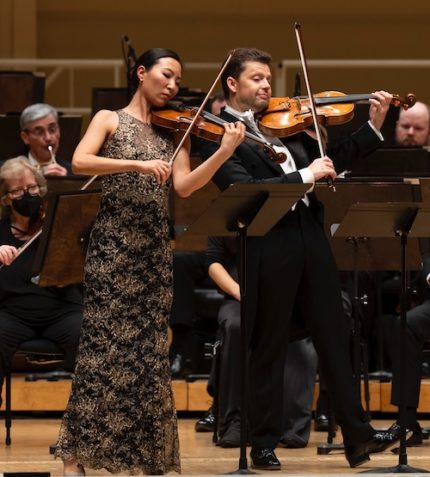Triple-threat Rachlin performs with CSO in stylish Mozart

As can often be the case following homestands from music director Riccardo Muti, the atmosphere felt more relaxed at Symphony Center this week. Thursday night the triple-threat Julian Rachlin—as violinist, violist and conductor—led two substantial Mozart works in an enticing program that also featured early Beethoven and some lesser-known Tchaikovsky.
Mozart produced three concertos for pairs of instruments between 1778 and 1779: the first for flute and harp, the second for two pianos, and finally the great Sinfonia Concertante in E-flat Major for Violin and Viola, K. 364, performed Thursday night. In all these works one hears Mozart experimenting to great effect with dialogic instrumental writing that seems to anticipate the glorious vocal interaction of his late operas.
With Rachlin leading from the viola, joined by CSO associate concertmaster Stephanie Jeong as his co-soloist, the two made a stylish, simpatico pair, capturing the work’s intimate, conversational spirit. Rachlin led a spacious introduction that projected the operative “maestoso” and from which the soloists’ subtle, suspended entrance seemed to emerge organically. Jeong’s lithe tone and pristine technique are particularly well-suited to this repertoire, and Rachlin led convincingly from the lower solo line.
The pair plumbed the depths of the Andante, with sustained playing that captured the movement’s anguished expression, and also allowed its rare moments of resolution to feel like genuine respite. The Presto finale went with charm and elan, the two soloists coyly tossing lines back and forth, and again like the operas, providing a comic ending after the preceding pathos.
The “Linz” symphony (No. 36) in C Major, K. 425 was the other Mozart offering. Rachlin was a sensitive leader throughout, providing gentle inflections, and offering direction that was fitfully workmanlike yet never heavy-handed. The ponderous slow introduction had the requisite gravitas, and the Allegro spiritoso vigor to spare.
There is more poetry to be mined in the lilting Andante than was in evidence Thursday night, though the swaggering Menuetto felt dancelike and sure footed. Rachlin proceeded without pause into the Presto finale, and while he could have found more wit in Mozart’s several deceptive endings, still brought the evening to a jubilant close. Principal oboe William Welter was a standout, making delicate, refined solo contributions on seemingly every page of the score.
The “Linz” was preceded by Rachlin picking up his 1704 “ex Liebig” Stradivarius for Tchaikvosky’s “Meditation” from Souvenir d’un lieu cher, as orchestrated by Alexander Glazunov. The piece felt out of place in the otherwise Viennese program, but Rachlin lofted Tchaikovsky’s soaring lines and captured the movement’s reflective, bardic aspects, particularly over Lynne Turner’s strummed harp accompaniment. The Glazunov orchestration is typically inventive, calling for swirling clarinet solos that were nimbly dispatched by principal clarinet Stephen Williamson.
The program began with Beethoven’s Overture to The Creatures of Prometheus. The opening wind chorale emerged exceptionally pure and luminous, with all wind principals on hand, and Rachlin brought a bustling energy to the brief curtain-raiser’s fleet main section.
The program will be repeated 8 p.m. Friday and Saturday. www.cso.org
Posted in Performances

